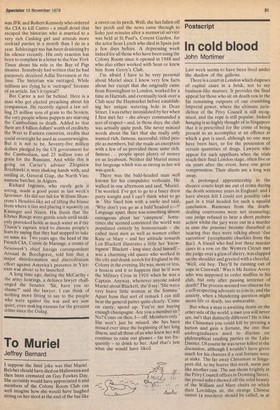In cold blood
John Mortimer
Last week seems to have been lived under the shadow of the gallows.
There is a court in London which disposes of capital cases in a brisk, not to say business-like manner. It provides the final appeal for those who sit on death row in the far remaining outposts of our crumbling Imperial power, where the ultimate jurisdiction of the Privy Council is still recognised, and the rope is still popular. Indeed hanging is so highly thought of in Singapore that it is prescribed for the crime of being present as an accomplice at an offence at which a gun is used, although no one may have been hurt, or for the possession of Certain quantities of drugs. Lawyers who appear for such appellants when the trials reach their final London stage, often five or six years after the event, have one great compensation. Their clients are a long way away.
A prolonged apprenticeship in the divorce courts kept me out of crime during the death sentence years in England: and I have always felt I could not possibly take part in a trial headed for such a squalid conclusion. Rumours from the deathdealing courtrooms were not reassuring; one judge refused to hear a short probate action whilst the jury were out in a murder in case the prisoner became disturbed at hearing that they were talking about 'due execution' (sycophantic chuckles from the Bar). A friend who had lost three murder cases in a row on the Western Circuit met the judge over a glass of sherry, was clapped on the shoulder and greeted with a cheerful, 'Well, old boy. They'll be running out of rope in Cornwall.' Was it Mr Justice Avory who was supposed to order muffins in his club, but only after passing sentence of death? The process seemed too obscene for a self-respecting advocate to join in; and the anxiety, when a blundering question might mean life or death; too unbearable.
But when a man is awaiting death on the other side of the world, a man you will never see, isn't that distinctly different? He is like the Chinaman you could kill by pressing a button and gain a fortune, the one that undergraduates used to discuss on philosophical reading parties in the Lake District. Of course he was never killed in the discussion, although 1 wouldn't have given much for his chances if a real fortune were at stake. The far away Chinaman in Singapore did, to my horror this week, seem just like another case. The sun shone brightly in the Privy Council offices in Downing Street, the proud usher showed off the solid beauty of the William and Mary chairs on which their Lordships sit, the strange Chinese names (a murderer should be called, as at an English prep school, by his surname only, but which is his surname, is it the first odd monosyllable or the last?) seemed a little comic, mispronouncing them raised, almost, a faint sigh of amusement in Court. And in half an hour it was all over and could be forgotten, out inthe sunshine, at lunch, at Peter Shaffer's civilised play about Mozart at the National Theatre in the evening. Another job done.
When crime is becoming more brutal, when a third of the population has been slaughtered in Cambodia, are we unreasonably dainty in finding the death penalty repugnant? I don't think so. The problem is that men and women are done to death in squalid circumstances by society in our name, to slake some primitive longing for vengeance which is wrongly attributed to us. A judicial hanging degrades us all. But if we have decided to exorcise this barbarity in England should we permit our legal system, even quietly and in that unostentatious panelled room in Downing Street, to decide matters of life and death, particularly when death is so often the answer?
When the late, variously lamented Mr Reggie Maudling was Home Secretary he discussed with an enlightened Civil Servant the propriety of bringing back hanging. 'All right then, but who would you get to do it?'the permanent official asked him wearily. 'Would you put an advertisement in the Daily Telegraph?' Killing people is not, in fact, a thing that can be done discreetly. Last week on the radio a 'chat show' regular (a man of whom Churchill might have written, 'Never in the course of human history has so little been said at such length and in so many words') was lamenting the vulgarity of American executions, the witnesses, the incessant TV interviews, the radio bulletins calling the condemned man by his Christian name. Well, I have news for all 'chat show' stars: there is no such thing as an execution in good taste.
In fact good taste should be removed from the subject altogether, and that is really my objection to our continued participation in the death penalty from the William and Mary chairs of the Privy Council office. If we can't face doing it on prime time on commercial telly when we all get to know and feel about it, far better not to dolt at all.
Of course we all have our own way of looking at these huge problems of life and death and the misfortunes of others. A murderer of doubtful sanity was being defended this week by an advocate who quoted Macbeth in support of his client's claim to mental instability: Who can minister to a mind diseased Pluck from the memory of rooted sorrow. , . ?'
Certainly, it seemed, not the National Health Service. After his client had got life the lawyer went to lunch with an actor, to whom he told the story of an unsuccessful morning in Court. The actor was not only sympathetic but deeply understanding, 'That bloody play never brought anyone any luck.'







































 Previous page
Previous page